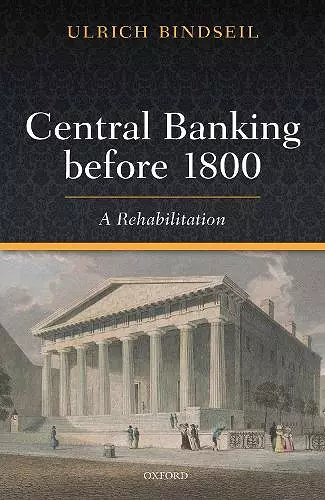Central Banking before 1800
A Rehabilitation
Format:Hardback
Publisher:Oxford University Press
Published:26th Dec '19
Currently unavailable, and unfortunately no date known when it will be back

Although central banking is today often presented as having emerged in the nineteenth or even twentieth century, it has a long and colourful history before 1800, from which important lessons for today's debates can be drawn. While the core of central banking is the issuance of money of the highest possible quality, central banks have also varied considerably in terms of what form of money they issued (deposits or banknotes), what asset mix they held (precious metals, financial claims to the government, loans to private debtors), who owned them (the public, or private shareholders), and who benefitted from their power to provide emergency loans. Central Banking Before 1800: A Rehabilitation reviews 25 central banks that operated before 1800 to provide new insights into the financial system in early modern times. Central Banking Before 1800 rehabilitates pre-1800 central banking, including the role of numerous other institutions, on the European continent. It argues that issuing central bank money is a natural monopoly, and therefore central banks were always based on public charters regulating them and giving them a unique role in a sovereign territorial entity. Many early central banks were not only based on a public charter but were also publicly owned and managed, and had well defined policy objectives. Central Banking Before 1800 reviews these objectives and the financial operations to show that many of today's controversies around central banking date back to the period 1400-1800.
an important contribution to a revisionist history of central banks... Bindseil's history of early central banking is a refreshing corrective to the mannerist orthodoxy that still prevails. * Anthony C. Hotson, Centre for Financial History, University of Cambridge, EH.Net *
All in all, Bindseil's book is an excellent resource and — in the words of his title — rehabilitation, and will surely be a standard reference point for years to come for anyone wishing to understand where and how central banking began to emerge. * Michael Reddell, Central Banking *
in undertaking this wholesale revision of our understanding of central banking, Bindseil has with this book made an important contribution to the study of the subject... and - and this is I think the real value of Bindseil's work - he has enabled us not only to look at past institutions with renewed interest, but reassess their modern day successors with fresh eyes as well ...this is not just an important book, but a hugely timely one as well. * John Nugée, Laburnum Consulting *
In this work of great historical scholarship, Bindseil argues that many of the leading banks in Europe could be properly designated as Central Banks in periods before 1800.In his efforts to overthrow prior conventional assessments of the development of Central Banking, Bindseil has fruitfully revisited and unearthed a wealth of early banking history, and his work should stimulate valuable further discussion of the origins of Central Banking. * Charles Goodhart, London School of Economics *
In this compelling historical account of early central banking,Bindseil corrects the popular modern view that the key elements of central banking were only establishedaround the beginning of the twentieth century. He convinces the reader with a fascinating set of examplesof central banking in Europe over the previous four centuries. * Darrell Duffie, Stanford University *
A treasure trove for information about early central banking, facts and ideas. * Martin Hellwig,, Max-Planck Institute for Research on Collective Goods, University of Bonn *
People interested in the drama of modern central banking may be surprised to learn that most of the script was written before 1800. This book offers a comprehensive collection of the life histories of early central banks, with storylines that are always informative even if they rarely feature happy endings. The relevance of these narratives is illuminated by a novel conceptual framework that connects the hard lessons of history to the challenges faced by present-day central banks. * William Roberds, Federal Reserve Bank of Atlanta *
ISBN: 9780198849995
Dimensions: 241mm x 161mm x 24mm
Weight: 652g
336 pages